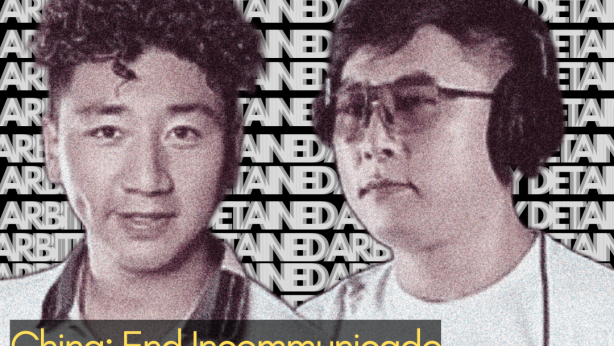China launches ‘Strike Hard’ campaign in Tibetan areas
Chinese authorities in Kanlho (Ch: Gannan) Tibetan Autonomous Prefecture, Gansu Province, has issued a public notice ‘encouraging’ the general public to secretly report to the police any ‘illegal’ activities aimed at harming ‘social stability’ and ‘national unity’.
This public notice, written in Tibetan and Chinese languages, was issued on 9 March 2012, a politically sensitive month for the Chinese authorities in Tibet. Kanlho Prefecture has witnessed continued Tibetan protests against the Chinese government. There are not a single county in Kanlho that has not witnessed a demonstration or protest march since 2008. Even Tibetan schoolchildren rose up in protest. In 2008, 12 known Tibetans were shot dead by the security officers for participating in peaceful protests. In recent months, a Tibetan schoolgirl, Tsering Kyi died of self-immolation protest in Machu (Chinese: Maqu) county. Other cases of arbitrary practices and official abuse of power are common in Tibetan areas in Kanlho.
This notice, issued in all eight counties of Kanlho Prefecture, is prominently displayed in the streets, on the walls and even on the tree trunks.
The notice emphasizes ‘striking hard’ on ‘illegal’ activities. The Tibetan words for Strike Hard are ‘Dungdek Dakpo’ or ‘Dungdek Tsenon’. The ‘Strike Hard’ campaign, also known as Yanda in Chinese, was first launched in China in 1983 to crack down on crimes such as gun and gang crime, telecom fraud, human trafficking, robbery, prostitution, gambling and drugs, etc. But in Tibet, the campaign is used for political purposes to forewarn Tibetans from taking part in any of protests and demonstrations during politically-sensitive months. Human rights activists have said that many human rights violations in Tibet occur during the implementation of the Strike Hard campaigns.
In the early years of its implementation in Tibet Autonomous Region, the Strike Hard campaign was launched on seasonal basis such as ‘Winter Strike Hard’ and ‘Summer Strike Hard’ that would last for two months. Under this campaign, security presence increase considerably with random raids conducted on residential and commercial complexes including private homes, hotels, bars, cafes, etc. Many get rounded up on mere suspicion in such raids. Arbitrary arrest, detention, interrogation and torture, dismissal from jobs and expulsion from religious institutions are common consequences of the Strike Hard campaign.
The official practice of paying money to the public to get information is not new. In the aftermath of widespread protests in 2008, the authorities in Lhasa and Kardze Prefecture openly announced a reward of Yuan 20,000 to anyone who provided information about those Tibetans who took part in protests.
The phrase ‘beating, smashing, looting and burning’ was first used by the Chinese authorities to label Tibetans who participated in the demonstrations in Lhasa in 1989. In 2008, this phrase was used ad nauseum by the Chinese authorities to describe the Tibetans who took part in 14 March 2008 protest in Lhasa. But the official propaganda behind this phrase was exposed by the Beijing-based think-tank called Gongmeng or Open Constitution Initiative in a daring investigative report in 2009.
Below is a translated version of the notification:
Notification of Kanlho Public Security Bureau Encouraging the Masses of Kanlho Prefecture to Expose and Report on Anyone Committing Illegal Activities Harming Social Stability
To maintain Kanlho social and political stability, speed up and promote the building of a “harmonious Kanlho”, create a favorable economic and investment environment, prevent and strike hard on illegal and criminal acts that endanger social stability, to encourage the broad masses to actively expose the criminals, by reporting to PSB, which has been authorized by the relevant stability maintenance authority to issue the following notice:
I. The Public Security organs will strike hard on anyone engaging in the following acts, which seriously harm national security and disrupt social stability, undermine national unity:
1) Instigating inter-ethnic relations, creating unrest between nationalities, engaging in ethnic separatism and destroying national unity.
2) Inciting and advocating the public to split the nation by means of speeches, writings, drawings and films, etc. are acts that threaten social order and social stability.
3) Participating in and promoting illegal organisations or giving guidance and donations to such organizations are acts that endanger national security and harm social stability.
4) Fabricating and disseminating rumors on social networking sites, distributing harmful information through internet and phone, are illegal acts that harm social stability.
5) Devising plans to engage in illegal activities of “beating, smashing, looting, burning” and other violent means to disrupt social order and public security
II. The broad masses of the people should actively take action, and actively provide clues for the public security organs to expose these criminal acts. Anyone who report such criminal activities to public security organs shall be provided personal protection and their identities will be kept confidential expositions clues the public security to verify the true minimum 5,000 yuan reward.
III. This directive will be implemented from the day of the announcement.
IV. To report, contact 0941-6696271, 66962723


